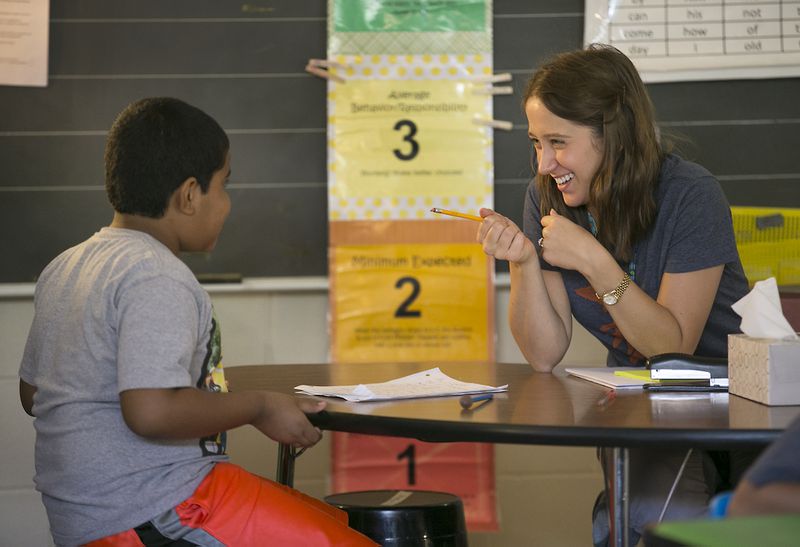University of Georgia education professor Peter Smagorinsky is a regular contributor to the AJC Get Schooled blog.
Today, he shares a lovely essay about a former of student who reached out to him 35 years later to thank him. The man was not thanking Smagorinsky for what he taught him, but what he showed him -- kindness, compassion and caring at a tragic point in his life.
By Peter Smagorinsky
“Thank you for becoming a teacher. I'm not sure you even remember this but my mother, 3-year-old brother and I were involved in a car accident that took her life and put me in the hospital at the end of my freshman year. I didn't return to school until December of the following year. Looking back I was angry, lost and slightly out of control. Even though I wasn't in any of your classes, you always talked to me asked how I was doing, keep me engaged and most of all held me accountable for my actions. That helped keep me on track and move forward. You were a positive influence on my life and helped me more than you'll ever know.”
I recently got this note via Facebook from a student I taught in Illinois in about 1980. I share it with some reticence, given it may strike some as self-aggrandizing to start this essay with such a thankful note. I’m sure there are at least a few other students from my past with less generous memories.
Credit: Maureen Downey
Credit: Maureen Downey
As you can imagine, getting this note was an emotional experience for me. I always prided myself on having good technical skills in terms of designing instruction, responding promptly to student work, and doing all the things I was taught to do in my master’s program to promote student learning.
But Jeff, who authored this note, attended to something else entirely. At about the age of 50, what he remembered from when he was 15 was how we talked in the hallways and in the gym after school in the years after I taught him, when he was reeling from the loss of his mother.
Like a lot of kids, he was going through an emotional time. His, I’m sure, was far more traumatic than most; as I wrote him in response, I can’t imagine the pain he was going through at the time.
But adolescence is a rocky emotional time for just about every kid, and young people are still building the resources they need to become resilient in the face of adversity. They really need emotional support from the adults who surround them, but it can be hard to find.
I’m reminded of Maya Angelou’s lovely aphorism: “People will forget what you said. People will forget what you did. But people will never forget how you made them feel.” Notes like Jeff’s help me to understand just how important the caring aspect of teaching is. Even in my late 20s, when I taught Jeff and when my own life was still taking shape in fits and starts, I seem to have understood the technical aspects of teaching, while quite important, are only part of what matters in being a valuable faculty member.
I offer this experience not to promote my own reputation, but to illustrate what I find so tragic about the Arne Duncan era in American education. Helping to console a devastated student might well be the most important thing a teacher does, but it has absolutely no merit in today’s version of accountability. Rather, only the most technical of instructional skills gets counted in a teacher evaluation, and the only skills that matter lead to the narrowest measure of learning, the ability to perform on a standardized test.
It’s hard for me to believe the public is accepting this view of effective schooling. I have no idea of what Jeff’s test scores were like or what I did to influence them, but whatever happened on that front, it’s nothing he remembers many decades later. Rather, it’s that I took a little time whenever I saw him to ask him how he was doing and encourage him to persevere.
In doing so, I was not uncommon. My fellow teachers loved their students as people, and many did what I did for Jeff routinely. We loved what we did as subject-matter teachers as well, but never thought we were teaching interchangeable humanoid modules. Rather, we were oriented to knowing who they were and helping them to become who they might be. In spite of what Arne Duncan has imposed on the profession, many of today’s teachers are similarly concerned with kids’ development into healthy and happy adults.
Doing so requires more than technical instructional skills. It requires us to care for the kids in terms of their many emotional needs, in some cases, needs not being well met at home because their parents are gone so much of the time. To me, this broad caring disposition by teachers toward their students is what makes people think of schools as communities, and what makes people look back on school experiences with strong, positive feelings.
Dear Readers, let me pose this question to you: What do you remember about being in school? What lingers for you after you’ve forgotten the dates and names and rivers you memorized for tests? What benefitted you as you moved out into your life?
And then ask: What sort of memories will your own children have of an education predicated on a technical-only version of accountability that makes caring about them irrelevant in the minds of those in charge?
If you are worried about what the answer might be to this last question, then I hope you begin talking with your neighbors, school administrators, and government representatives about what needs to change for school to provide the next generation of students with something more than what they’re now getting when the only thing that matters is what can be reduced to numbers.







